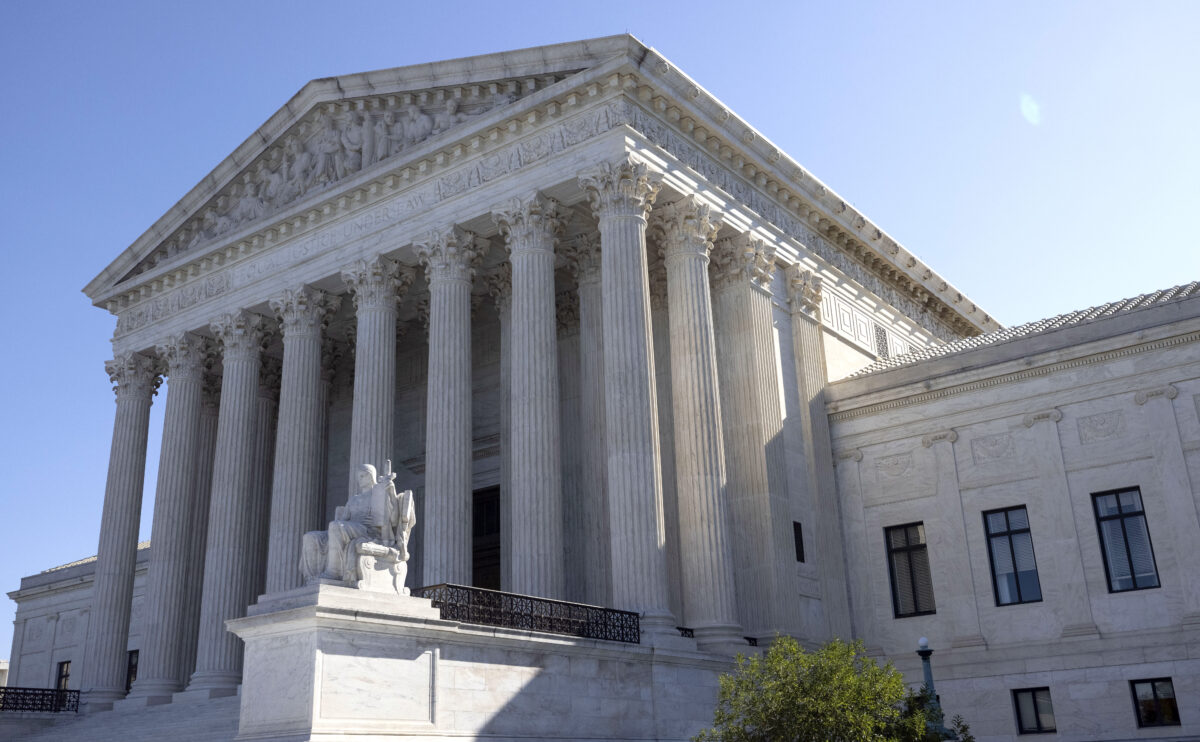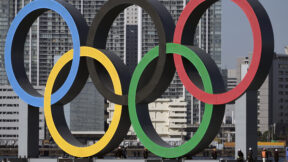‘The Onion’ Files Hilariously Epic Amicus Brief in SCOTUS Case of Man Arrested for Parody Facebook Posts Mocking Cops

Photo by Kevin Dietsch/Getty Images.
The Onion filed a brief with the Supreme Court of the United States in support of a man arrested for writing parody Facebook posts mocking his local police department, and it’s just as epic as you might expect.
In 2016, Anthony Novak created a Facebook page parodying the Parma, Ohio Police Department, and posted six posts on it, “all obvious parody,” as the Institute for Justice wrote in their legal brief petitioning the Supreme Court to review the case. The page lacked the verification checkmark and other insignia that an official government page would have displayed, had the grammatically-incorrect quote “We no crime” as its “satirical slogan,” and the posts had patently outrageous content, such as claiming the cops were conducting a food drive to pay for teen abortions and threatening to arrest anyone seen outside their homes on a “stay inside and catch up with the family day.”
The Parma cops were, to put it mildly, unamused. One officer appeared on the local news to announce a criminal investigation into the page. Alarmed, Novak took the page down, but the investigation continued. He was arrested nearly a month later, with his apartment searched and laptop and phone seized. He was then jailed for four days.
Novak was indicted by a grand jury after testimony from a detective who claimed that people had called into the department and “honest to God believed” the parody page was real. The detective admitted in a deposition later that none of the callers actually believed that.
At trial, Novak was acquitted and then sued the City of Parma and the individual police officers involved for violating his First and Fourth Amendment rights. The defendants asserted qualified immunity in a motion to dismiss, and after several rounds of proceedings and appeals, the Sixth Circuit granted the officers a qualified immunity defense despite having previously found that Novak’s posts were indeed parody, and recognizing that the right to ridicule the government in this way was as American as “[a]pple pie [and] baseball…when it comes to parody, the law requires a reasonable reader standard, not a ‘most gullible person on Facebook’ standard.”
Novak filed a petition for a writ of certiorari, asking the Supreme Court to review his case, and on Monday, The Onion filed an amicus curiae brief (Latin for “friend of the court,” referring to a brief filed by a non-party that asserts some interest or knowledge relevant to the case).
Patrick Jaicomo, the lead attorney on the Institute for Justice team representing Novak, shared The Onion’s brief on his Twitter account, gleefully declaring it “the best amicus brief I’ve ever read.”
🚨Excited to share that @TheOnion has filed the best amicus brief I’ve ever read in favor of @IJ‘s cert petition in Novak v. Parma. Novak challenges the 6th Cir’s use of #QualifiedImmunity to deny #FreeSpeech protections to a parodist. 1/ @SCOTUSblog https://t.co/cdnh8FUAZj pic.twitter.com/xGAGUABNsU
— Patrick Jaicomo (@pjaicomo) October 3, 2022
The brief deftly employs The Onion’s well-known satirical humor, opening with a series of patently obvious lies declaring themselves to be “the world’s leading news publication” with “a daily readership of 4.3 trillion,” claiming that they were founded as a print newspaper in 1756 (they were actually launched as a weekly print edition in 1988 and started online in 1996), and employed “more than 350,000 full- and part-time journalism jobs in its numerous news bureaus and manual labor camps stationed around the world,” and that the company “owns and operates the majority of the world’s transoceanic shipping lanes, stands on the nation’s leading edge on matters of deforestation and strip mining, and proudly conducts tests on millions of animals daily.”
The satire site pointed out one of their more infamous examples of life imitating art, when a 2017 Onion article headlined “Mar-A-Lago Assistant Manager Wondering If Anyone Coming To Collect Nuclear Briefcase From Lost And Found” ended up “revealing that a former president kept nuclear secrets strewn around his beach home’s basement three years before it even happened,” referring to the FBI executing a search warrant at Mar-a-Lago this summer (a case that has generated its own humorous escapades, but I digress).
The site’s lawyers intermixed the humor with serious legal arguments throughout the brief.
“The Onion files this brief to protect its continued ability to create fiction that may ultimately merge into reality,” they argued. “As the globe’s premier parodists, The Onion’s writers also have a self-serving interest in preventing political authorities from imprisoning humorists. This brief is submitted in the interest of at least mitigating their future punishment.”
They were “justifiably concerned” about the Sixth Circuit’s ruling, the brief continued, because it “imperils an ancient form of discourse” by suggesting that “parodists are in the clear only if they pop the balloon in advance by warning their audience that their parody is not true.”
“But some forms of comedy don’t work unless the comedian is able to tell the joke with a straight face. Parody is the quintessential example. Parodists intentionally inhabit the rhetorical form of their target in order to exaggerate or implode it—and by doing so demonstrate the target’s illogic or absurdity.”
A lengthy section discussed the very nature of parody and how it requires mimicking the intended target in order to function, referencing a 1997 AP-style article The Onion published headlined, “Supreme Court Rules Supreme Court Rules,” which included a fake quote from a justice stating, “while the U.S. Constitution guarantees equality of power among the executive, legislative, and judicial branches, it most definitely does not guarantee equality of coolness.”
Citing Jonathan Swift’s famous work, A Modest Proposal, which proposed cooking and eating babies in response to Irish poverty in the eighteenth century, the lawyers declared The Onion’s writers to be “far more talented” than “that hack Swift,” but that they do “share with Swift the common goal of replicating a form precisely in order to critique it from within.”
“That leverage of form—the mimicry of a particular idiom in order to heighten dissonance between form and content—is what generates parody’s rhetorical power,” they added.
After a final section using a string of Latin legalisms to tell yet another joke, the attorneys concluded by voicing The Onion’s support for the Supreme Court to review the case and rule in Novak’s favor.
“The Onion intends to continue its socially valuable role bringing the disinfectant of sunlight into the halls of power,” they wrote. “And it would vastly prefer that sunlight not to be measured out to its writers in 15- minute increments in an exercise yard.”
Read the full amicus curiae brief filed by The Onion below:
—
New: The Mediaite One-Sheet "Newsletter of Newsletters"
Your daily summary and analysis of what the many, many media newsletters are saying and reporting. Subscribe now!






Comments
↓ Scroll down for comments ↓